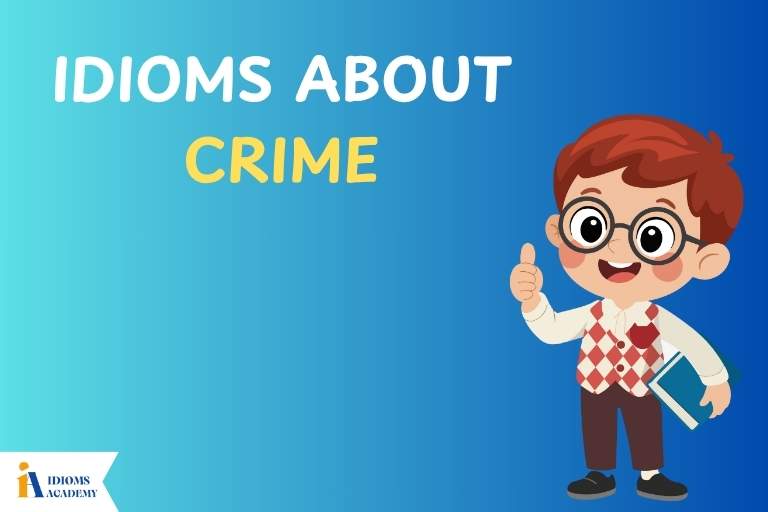In the United States, people often use special phrases called idioms to talk about doing good things. These idioms help us describe when someone helps others, works hard, or tries to be a better person. They are part of everyday American conversations, whether at home, school, or work. Idioms make language more fun and help us understand each other in creative ways.
When you hear someone say, “go the extra mile” or “have a heart of gold,” they don’t mean it exactly. These phrases mean someone is being kind, helpful, or hardworking. Learning idioms like these can help kids and adults in the USA speak with more meaning and connection. In this article, we’ll explore 40 idioms about doing good and show you how to use them in real life.
Idioms About Doing Good
1. Go the extra mile
Meaning: To do more than expected
Example Sentence:
- My teacher went the extra mile to help me understand math.
- Mom goes the extra mile to make everyone’s birthday special.
Other ways to say: Go above and beyond, give extra effort
Fun Fact/Origin: This comes from the Bible, where people were told to walk an extra mile when asked.
Usage: Used when someone is being very helpful or doing more than needed.
2. A heart of gold
Meaning: To be kind and caring
Example Sentence:
- Grandma has a heart of gold; she always bakes cookies for the neighbors.
- Coach Joe has a heart of gold and cheers for every player.
Other ways to say: Very kind, sweet-hearted
Fun Fact/Origin: Gold is precious, so a heart made of gold means a precious and kind person.
Usage: Used to describe someone who is nice and loving.
3. Lend a hand
Meaning: To help someone
Example Sentence:
- Can you lend a hand with these groceries?
- She lent a hand at the animal shelter over the weekend.
Other ways to say: Help out, pitch in
Fun Fact/Origin: From when people helped with farming or carrying heavy things.
Usage: Used when offering or giving help.
4. Put your best foot forward
Meaning: To try your hardest
Example Sentence:
- He put his best foot forward in the school play.
- She always puts her best foot forward at soccer practice.
Other ways to say: Try your best, give it your all
Fun Fact/Origin: It may come from the idea of starting off on the right foot.
Usage: Used when someone is doing their very best.
5. Brighten someone’s day
Meaning: To make someone feel happy
Example Sentence:
- Her smile brightened my day.
- A kind note can brighten someone’s day.
Other ways to say: Cheer up, lift someone’s spirits
Fun Fact/Origin: Comes from the idea of sunshine making a cloudy day better.
Usage: Used when something makes another person happy.
6. Do a good turn
Meaning: To do something nice for someone
Example Sentence:
- He did a good turn by shoveling the snow for the neighbor.
- Doing a good turn can make the world a better place.
Other ways to say: Do a kind act, help someone
Fun Fact/Origin: A classic Boy Scouts phrase about doing daily good deeds.
Usage: Used when someone helps without being asked.
7. Raise the bar
Meaning: To set a higher standard
Example Sentence:
- Her volunteer work raised the bar for others.
- That student’s project raised the bar for the whole class.
Other ways to say: Set a higher goal, do better
Fun Fact/Origin: Comes from high-jump sports, where raising the bar makes it harder.
Usage: Used when someone improves something by doing really well.
8. Worth their salt
Meaning: To be good at your job or role
Example Sentence:
- A teacher worth their salt cares about their students.
- He’s worth his salt as a firefighter.
Other ways to say: Skilled, deserving
Fun Fact/Origin: Salt was very valuable long ago; being “worth salt” meant you were valuable too.
Usage: Used to praise someone for doing their job well.
9. Spread kindness
Meaning: To be kind to many people
Example Sentence:
- She spread kindness by making cards for the hospital.
- You can spread kindness just by saying “thank you.”
Other ways to say: Be thoughtful, share love
Fun Fact/Origin: “Spread” means to pass along, like spreading butter on toast.
Usage: Used to talk about doing many small kind acts.
10. Be the bigger person
Meaning: To choose kindness over fighting
Example Sentence:
- Even when he was teased, he was the bigger person and walked away.
- She was the bigger person and apologized first.
Other ways to say: Take the high road, stay calm
Fun Fact/Origin: This means acting with maturity, even if others are not.
Usage: Used when someone chooses peace instead of arguing.
11. Light a spark
Meaning: To inspire someone
Example Sentence:
- Her speech lit a spark in the crowd to help others.
- A good teacher can light a spark in students.
Other ways to say: Inspire, motivate
Fun Fact/Origin: A spark can start a fire, just like an idea can start action.
Usage: Used when someone starts something positive.
12. A pat on the back
Meaning: A small thank-you or praise
Example Sentence:
- He got a pat on the back for helping clean up.
- Mom gave me a pat on the back after I finished my homework early.
Other ways to say: Praise, compliment
Fun Fact/Origin: Comes from actually patting someone’s back to say “good job.”
Usage: Used to give someone credit for doing well.
13. In good hands
Meaning: Being taken care of well
Example Sentence:
- Don’t worry, your puppy is in good hands with the vet.
- Grandma’s plants are in good hands with me.
Other ways to say: Safe, well cared for
Fun Fact/Origin: This idiom compares good care to safe hands holding something.
Usage: Used to show someone is safe or well supported.
14. Do your part
Meaning: To help in a group effort
Example Sentence:
- Everyone needs to do their part to keep the classroom clean.
- He did his part by recycling every day.
Other ways to say: Help out, take responsibility
Fun Fact/Origin: Often used in teamwork or public service.
Usage: Used when everyone is expected to help.
15. A force for good
Meaning: Someone or something that helps others
Example Sentence:
- The food bank is a force for good in our city.
- She is a force for good at school, always helping others.
Other ways to say: Positive influence, helper
Fun Fact/Origin: “Force” means power, and “good” means for others’ benefit.
Usage: Used to describe people or groups doing helpful things.
16. On the right track
Meaning: Doing the correct thing
Example Sentence:
- If you’re helping others, you’re on the right track.
- Studying hard means you’re on the right track for good grades.
Other ways to say: Going in the right direction, doing well
Fun Fact/Origin: Comes from trains staying on tracks to reach the right place.
Usage: Used when someone is doing what they should.
17. Carry the torch
Meaning: To continue a good cause
Example Sentence:
- She carried the torch for her grandfather by helping at the shelter.
- We carry the torch by keeping the community clean.
Other ways to say: Keep going, continue the mission
Fun Fact/Origin: Comes from passing a real torch in races or Olympics.
Usage: Used when someone continues a good idea or tradition.
18. Keep your chin up
Meaning: Stay positive in tough times
Example Sentence:
- Even when things are hard, keep your chin up.
- He kept his chin up after losing the game.
Other ways to say: Stay strong, be brave
Fun Fact/Origin: Lifting your chin shows courage and confidence.
Usage: Used when encouraging someone.
19. Pitch in
Meaning: Help with a task
Example Sentence:
- Everyone pitched in to clean the park.
- Let’s all pitch in and set the table.
Other ways to say: Help out, join in
Fun Fact/Origin: “Pitch” means throw or toss, as in throwing effort into the job.
Usage: Used when a group works together.
20. Take the high road
Meaning: To choose honesty and kindness
Example Sentence:
- Even when she was blamed, she took the high road.
- He took the high road by staying kind.
Other ways to say: Be mature, act with class
Fun Fact/Origin: Refers to choosing the better, though harder, path.
Usage: Used when someone acts with goodness instead of being mean.
21. Give it your all
Meaning: Try as hard as you can
Example Sentence:
- He gave it his all during the race.
- I gave it my all when helping with the school fundraiser.
Other ways to say: Try your best, give full effort
Fun Fact/Origin: Often used in sports or big efforts.
Usage: Used when someone tries really hard.
22. Big-hearted
Meaning: Very kind and generous
Example Sentence:
- Our teacher is big-hearted and always listens.
- She’s big-hearted and volunteers every weekend.
Other ways to say: Warm-hearted, kind
Fun Fact/Origin: The “heart” is seen as the center of kindness.
Usage: Used to describe someone who is very nice and helpful.
23. Take someone under your wing
Meaning: To care for and guide someone
Example Sentence:
- The older student took me under her wing.
- He took the new kid under his wing and showed him around.
Other ways to say: Look after, mentor
Fun Fact/Origin: Comes from birds protecting their chicks under their wings.
Usage: Used when someone protects or helps another person.
24. Lead by example
Meaning: To show others the right way by doing it yourself
Example Sentence:
- She leads by example by always being honest.
- If you clean up, others will follow. That’s leading by example.
Other ways to say: Be a role model, set an example
Fun Fact/Origin: Leadership is often stronger when shown through action.
Usage: Used to describe people who teach by doing.
25. A good egg
Meaning: A kind or dependable person
Example Sentence:
- My neighbor is a good egg—always ready to help.
- You’re a good egg for sharing your lunch.
Other ways to say: Nice person, solid friend
Fun Fact/Origin: Comes from comparing people to fresh (good) or rotten eggs.
Usage: Used as a fun way to say someone is good.
26. The cream of the crop
Meaning: The best of the group
Example Sentence:
- Those volunteers are the cream of the crop.
- She’s the cream of the crop in her class.
Other ways to say: The best, top pick
Fun Fact/Origin: Cream rises to the top of milk, so it’s the richest part.
Usage: Used when praising the best people or things.
27. Rise to the occasion
Meaning: To do well in a tough situation
Example Sentence:
- He rose to the occasion during the emergency.
- She rose to the occasion and helped her team win.
Other ways to say: Step up, meet the challenge
Fun Fact/Origin: Means lifting yourself to meet the moment.
Usage: Used when someone does great in a big moment.
28. Leave a mark
Meaning: To have a lasting impact
Example Sentence:
- Her kindness left a mark on the whole class.
- He left a mark by starting a new reading club.
Other ways to say: Make a difference, influence
Fun Fact/Origin: Comes from leaving a visible mark behind.
Usage: Used when someone’s actions are remembered.
29. The salt of the earth
Meaning: Very good, honest people
Example Sentence:
- Farmers who donate crops are the salt of the earth.
- Those nurses are the salt of the earth.
Other ways to say: Good folks, real people
Fun Fact/Origin: Salt was rare and valuable, so this means someone is precious.
Usage: Used to describe people who are truly good.
30. Step up to the plate
Meaning: To take responsibility
Example Sentence:
- He stepped up to the plate when the coach was out.
- She stepped up to the plate and helped the new student.
Other ways to say: Take charge, be responsible
Fun Fact/Origin: Comes from baseball—batters step up to the plate to hit.
Usage: Used when someone takes action.
31. Turn over a new leaf
Meaning: To start doing good after doing wrong
Example Sentence:
- He turned over a new leaf and started helping others.
- She turned over a new leaf and stopped being rude.
Other ways to say: Start fresh, change your ways
Fun Fact/Origin: Comes from turning a page (leaf) in a book.
Usage: Used when someone decides to be better.
32. Lift someone up
Meaning: To make someone feel better
Example Sentence:
- Her words lifted me up when I was sad.
- A simple smile can lift someone up.
Other ways to say: Cheer up, support
Fun Fact/Origin: Lifting means raising, just like emotions can rise.
Usage: Used when helping others feel happy or strong.
33. Be in someone’s corner
Meaning: To support someone
Example Sentence:
- My coach is always in my corner.
- Dad is in my corner no matter what.
Other ways to say: Support, back someone up
Fun Fact/Origin: Comes from boxing—helpers stand in the boxer’s corner.
Usage: Used when someone is cheering for or helping another.
34. Be all in
Meaning: To fully commit
Example Sentence:
- She was all in for helping the school fundraiser.
- I’m all in for making this place better.
Other ways to say: Fully involved, totally on board
Fun Fact/Origin: Used in card games like poker when betting everything.
Usage: Used when someone gives full effort.
35. Be full of goodwill
Meaning: To wish others well and act kindly
Example Sentence:
- He was full of goodwill during the holidays.
- Her heart was full of goodwill for her neighbors.
Other ways to say: Kind-hearted, thoughtful
Fun Fact/Origin: Goodwill is often shown in charity or friendly acts.
Usage: Used during times of kindness or giving.
36. Do the right thing
Meaning: To act with honesty and kindness
Example Sentence:
- She did the right thing and returned the wallet.
- Doing the right thing means helping, not hurting.
Other ways to say: Be fair, act kindly
Fun Fact/Origin: A popular phrase in American schools and homes.
Usage: Used when someone makes a good choice.
37. Be a good sport
Meaning: To be kind even when losing
Example Sentence:
- He was a good sport after the other team won.
- She’s always a good sport, win or lose.
Other ways to say: Play fair, be gracious
Fun Fact/Origin: Comes from sports, where kindness matters.
Usage: Used when someone stays positive during games or tough times.
38. Put others first
Meaning: To think about others’ needs before your own
Example Sentence:
- She put others first by giving her seat away.
- He always puts others first in group work.
Other ways to say: Be selfless, be thoughtful
Fun Fact/Origin: Often taught in families and schools to show care.
Usage: Used when someone is unselfish.
39. Have a giving heart
Meaning: To love helping others
Example Sentence:
- She has a giving heart and always donates toys.
- You can see his giving heart in everything he does.
Other ways to say: Kind, generous
Fun Fact/Origin: The “heart” is often used to show emotion and care.
Usage: Used when someone enjoys helping others.
40. Make the world a better place
Meaning: To do something kind or helpful for others
Example Sentence:
- Planting trees helps make the world a better place.
- Helping a friend makes the world a better place.
Other ways to say: Do good, improve lives
Fun Fact/Origin: Often used in songs and stories to inspire goodness.
Usage: Used when actions bring kindness and change.
Quiz: Idioms About Doing Good
Instructions: Choose the best meaning for each idiom. Each question has only one correct answer.
Question Key
1. What does it mean to “go the extra mile”?
A) Walk a long distance
B) Do more than expected
C) Take a shortcut
2. If someone has a “heart of gold,” they are:
A) Very fast
B) Very kind
C) Very strong
3. What does “lend a hand” mean?
A) Give someone your glove
B) Wave at someone
C) Help someone
4. If you “put your best foot forward,” what are you doing?
A) Trying your hardest
B) Running a race
C) Standing still
5. What does it mean to “brighten someone’s day”?
A) Give them a flashlight
B) Make them smile
C) Turn on the lights
6. If someone “does a good turn,” they are:
A) Spinning around
B) Being nice to someone
C) Driving in circles
7. What does “raise the bar” mean?
A) Make something harder or better
B) Lift a stick
C) Jump high
8. “Be the bigger person” means:
A) Be taller than others
B) Eat more
C) Choose kindness, not fighting
9. What does it mean to “carry the torch”?
A) Hold a flame
B) Run in the dark
C) Keep a good idea going
10. If someone “takes you under their wing,” they are:
A) Flying with you
B) Protecting and guiding you
C) Giving you feathers
11. What does “leave a mark” mean?
A) Draw with a pen
B) Have a lasting impact
C) Step in paint
12. “Step up to the plate” means:
A) Eat dinner
B) Play baseball
C) Take responsibility
13. If you “turn over a new leaf,” what are you doing?
A) Changing for the better
B) Raking leaves
C) Starting a garden
14. “Put others first” means:
A) Push them in line
B) Let them go before you
C) Give them your homework
15. What does “make the world a better place” mean?
A) Paint the Earth
B) Travel the globe
C) Do something kind or helpful
Answer Key
- B) Do more than expected
- B) Very kind
- C) Help someone
- A) Trying your hardest
- B) Make them smile
- B) Being nice to someone
- A) Make something harder or better
- C) Choose kindness, not fighting
- C) Keep a good idea going
- B) Protecting and guiding you
- B) Have a lasting impact
- C) Take responsibility
- A) Changing for the better
- B) Let them go before you
- C) Do something kind or helpful
Wrapping Up
Idioms about doing good help us talk about kindness, effort, and helping others in ways that are easy to remember. These phrases are often heard in homes, schools, and communities all across the USA. When we say someone has a “heart of gold” or they “go the extra mile,” we’re sharing more than just words—we’re showing values that matter.
By learning these idioms, kids and adults can speak in ways that show care and respect. They help us explain actions, praise others, and encourage good choices. Keep using these idioms to make your language more interesting and to spread more kindness every day.




